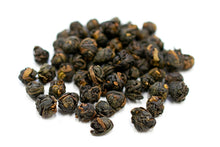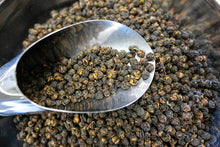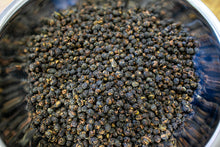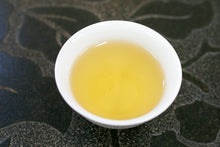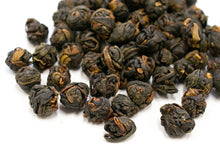Wild Tea Jasmine Pearl / 野生普洱茉莉龙珠
- Regular price
- RM230.00 MYR
- Sale price
- RM230.00 MYR
- Regular price
-
- Unit price
- /per
Adding product to your cart
Out of curiosity, we decided to create a jasmine tea based on Da Xue Shan Wild Raw Tea. This resulted in an exceptionally rare tea, not only in Japan but also in China.
Custom Production Network for Jasmine Tea
At our store, we source various types of base teas from different regions during the spring. These teas are then transported to a jasmine tea production factory in Guangxi Region for the scenting process. Thanks to this unique supply chain, we have the advantage of being able to process any type of tea we source into jasmine tea. Using our own original ingredients, we have developed many original jasmine teas, including Pu-erh raw tea, wild white bud tea, ripe Pu-erh tea, Jasmine Silver Needle, and Snow Jasmine.

Using Da Xue Shan Wild Tea as the Base
Driven by intense curiosity, we decided to create a jasmine tea using wild Pu-erh raw tea and undertook a custom production process.
Wild tea is completely different from commonly cultivated teas, naturally farmed teas, abandoned teas, or teas from tea gardens. This tea grows entirely on its own in the mountains, without any human intervention, making it a purely natural tea. Like natural seafood or wild herbs, it takes time to grow slowly in nature, resulting in exceptional quality as a raw material.
The raw material we used is our own "Da Xue Shan Wild Tea." This tea is made from the species Camellia taliensis. Most common teas are made from the species Camellia sinensis (where "Camellia" refers to the genus and "sinensis" to the species). Taliensis is closely related to the sinensis species.

The photos of wild tea tree
Camellia taliensis tea has a unique aroma reminiscent of grapes and young tree bark.
One of the most distinctive features of this wild tea is its intense and lingering aftertaste, similar to wild mountain vegetables. Additionally, the tea has a notably thick body characteristic of Camellia taliensis, making its flavor truly unique. Not surprisingly, our Da Xue Shan Wild Tea is a highly popular Pu-erh raw tea in our store.
In my experience, I have never seen or heard of this tea being processed into jasmine tea. Wild teas are already rare and difficult to obtain, and wild Pu-erh raw tea is particularly popular. Therefore, processing it into jasmine tea is unprecedented, not only in Japan and Malaysia, but also in China.
The Labor-Intensive Supply Chain Management for Custom Jasmine Tea Production
After sourcing Da Xue Shan Wild Tea from producers in Yunnan Province in March, the tea is first sent to Fujian Province for processing, where it is rolled into pearl shapes. Since the taliensis variety produces large tea leaves, the rolled pearls resemble South Sea black pearls in appearance.
These pearl-shaped tea leaves are then transferred to Guangxi Region, where they undergo the scenting process with high-quality jasmine flowers in the early autumn when the flowers bloom.

A tea with an unusual flavor for jasmine tea
Before brewing, the dried tea leaves exude an uplifting jasmine fragrance. Once brewed in hot water, the jasmine aroma becomes surprisingly subtle. The long-lasting aftertaste creates a depth that might contribute to the subdued jasmine scent. Additionally, while the distinctive aroma of the wild tea isn't immediately noticeable when drinking, it gradually emerges and lingers serenely in the mouth after finishing the tea. The long-lasting finish and lingering sweet taste make this tea offer more than just a jasmine bouquet, providing a fuller tea experience.

Most jasmine teas use green or white tea as the base, which provides a relatively subtle tea flavor that allows the jasmine to stand out. By using wild tea as the base, this tea offers a more distinctive flavor that harmonizes seamlessly with the jasmine bouquet. The aroma is more reminiscent of citrus, like mandarin oranges, rather than typical jasmine tea. The high quality of the ingredients strongly influences the aftertaste, and with just one sip, the body warms up, quickly inducing a pleasant tea-induced euphoria. Due to the superior quality of the ingredients, our internal tasters unanimously remarked, "It doesn't taste like traditional jasmine tea, but it has a deep flavor that makes you want to keep drinking.

Please note that production quantities are limited, so this tea will only be available while supplies last.






